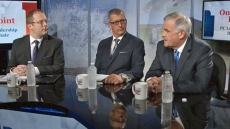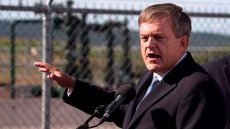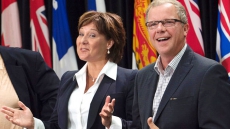WASHINGTON - Canadian policy-makers are trying to gauge the wide-ranging effect of plunging oil prices —whose impact on the national economy could be felt everywhere from the loonie, to imports and exports, government revenues and consumer spending.
The Bank of Canada says its monetary policy report in two weeks will attempt to measure the effect of oil prices, which are down nearly one-quarter since last year and which briefly dipped Friday below their lowest level in nearly four years.
Governor Stephen Poloz told a news conference at the global financial meetings in Washington that it's not easy to assess, given the need to weigh all the negative factors against the positives.
He noted that lower prices also mean higher disposable income for consumers, and said the bank's upcoming monetary report will attempt to assess all those variables.
Then there's the question of how long this trend will last.
"There's a question mark about whether it's a permanent decline, or not. That requires a judgment," Poloz told reporters. "It's not an easy analysis, because there's the consumers. Lower prices, perhaps. But that's higher incomes. The models are intended to work all that out. But it's very hard to do without a full general equilibrium assessment. So we'll save that for a couple of weeks."
A BMO bank analysis Friday concluded the trend could be particularly painful for oil-producing provinces, with Alberta seeing a three per cent dent in its provincial government revenue projections. The report titled, "Life With $85 Oil," concluded that the positives of cheap oil would be clearly outweighed by the negatives in the oil-producing provinces.
It noted that Alberta and Saskatchewan's governments had made their 2014-15 budget projections based on revenues from oil priced in the high 90s on the West Texas Intermediate benchmark, while Newfoundland had based its revenue projections on oil at $105 using the international Brent standard.
Another potential effect is a weaker Canadian dollar, and the wide-ranging economic consequences that entails for different sectors and different regions of the country.
The loonie dropped more than one-third of a cent Friday versus the U.S. dollar — this despite the fact Canada had a much better-than-expected jobs report.
On balance, the oil trend comes amid a period of relatively good news about the North American economy, which is performing significantly better than the rest of the developed world.
Finance Minister Joe Oliver described what he called Canada's happy fiscal position — with $10 billion more than expected in federal coffers last year, putting Ottawa in a position to cut taxes and balance the books while maintaining already-planned increases in provincial transfers.
He said he also heard lots of optimism about the American economy when he spoke to business leaders in New York last week, and pointed out that more spending in the U.S. can only benefit that country's biggest source of imports: Canada.
"Of course it's externalities that pose a risk," Oliver said Friday.
"Commodity prices are a reflection of a number of things. We're talking supply and demand."
In the U.S., supply of oil has skyrocketed with the help of new drilling technologies. And demand in the rest of the world is being dragged down by a sluggish economy, especially in Europe.
There's international pressure on Germany, Europe's biggest economy, to increase spending on things like infrastructure and scale back its budget-balancing plans.
International Monetary Fund boss Christine Lagarde warned the global economy faces what she calls a "new mediocre" normal without increased stimulus.
Germany has rebuffed such pressure, arguing that it can't fix the economy by writing cheques and saying that weaker-performing European countries needed structural reforms.





